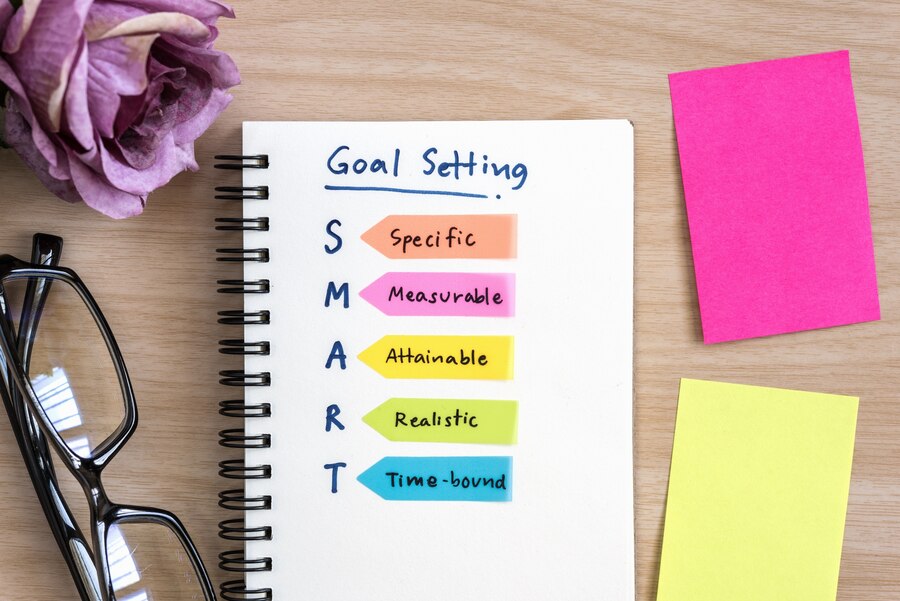Goal Setting For Career Growth: A 7-Step Guide
by Barsha Bhattacharya Job & Career Published on: 27 March 2024 Last Updated on: 28 March 2024

Whether you’re an American working from a cafe in Chicago or an Aussie working from office rentals in Melbourne, setting clear goals for your career growth has never been more important. For those stationed at the nexus of ambition and action, an effective strategy is essential. This guide provides a step-by-step approach to carving a path toward that end goal of professional fulfillment and success.
Why Is Goal Setting Crucial For The Growth Of One’s Career?
Goal setting is not new, and there are many instances in which individuals set their own goals and objectives. However, here we discuss the reason why one must set own goals and objectives.
It Can Improve The Performance Of The Employees
According to the idea of Letham and Locke, setting goals and objectives helps one visualize one’s own goals. There are five principles on which one sets one’s own goals. They include commitment, feedback, clarity, the complexity of the task, and Clarity. These are like the pillars anchoring on which you must visualize your goals. Different studies observe the fact that setting goals leads to enhanced performance.
Greater Job Satisfaction

Everyone, be it the professional or personal sphere, must be driven by goals and objectives. Setting goals provides an individual with more interesting tasks and challenges so that one can enjoy one’s work and do it more vigorously. Chasing and achieving the target after hard work gives an individual great job satisfaction.
Goal Setting Increases One’s Confidence.
Becoming complacent and settling down with less is detrimental to an individual’s confidence building. Low confidence and low self-image can indeed sabotage your purpose of life. It will stop your motivation and zeal to improve yourself continuously. Goal setting establishes life’s value, and attaining it can offer you the confidence you need. This is where you need to set small, medium, and long-term goals. It is detrimental to the growth of an individual.
Goal Setting Can Affect Work/Life Balance
Work-life balance is something that you must be careful about all the time. Disruption of it can reach you into the periphery of stress. It will be detrimental to your development. This is where you must work continuously to ensure work-life balance.
Being stuck in the position can be stressful. However, you continuously need to set new goals to encourage you. Your goals include getting a better job. Whatever may be your goals, you need to write them down.
Steps To Goal Setting
An individual’s progress will not be that adequate if there is low goal setting on the part of an individual. This is why an individual must dive into setting one’s own career goals for self-development. This is why an individual must organize the goals and take action according to these goals. However, let’s try to understand some steps to setting an individual’s goal.
1. Define your vision
The first step in goal setting is to define your ultimate vision. Imagine where you want to be in the next few years—consider the role, the industry, and even the work-life balance you aspire to achieve.
This vision will serve as your guiding light, helping you make decisions and prioritize actions that align with your long-term objectives. Reflect on what success means to you personally and professionally, and let this understanding shape your vision.
2. Set SMART goals

Transform your vision into actionable objectives by setting Specific, Measurable, Achievable, Relevant, and Time-bound (SMART) goals. For example, if your broad vision is to become an authority in your field, a SMART goal could be to publish a piece of thought leadership in a reputable industry publication within the next year. The SMART method ensures your goals are concrete and within reach, providing a clear direction for your career path.
3. Create a step-by-step plan
With SMART goals defined, map out the detailed steps necessary to achieve them. Break each goal into smaller, manageable tasks, and set deadlines for each.
If you aim to gain a promotion, identify the skills and experiences required, then plan how you will acquire them. This might involve seeking out specific projects, pursuing further education, or developing new competencies.
4. Perfect your environment
Your work environment plays a crucial role in your ability to focus, innovate, and collaborate. If you’re working for yourself, opt for a coworking space or office lease in a building designed to boost creativity, facilitate networking, and provide the amenities that support your work style.
If you work from home or in your employer’s space, take control of what you can by optimizing your workspace for creativity, focus, and productivity. The right environment can inspire and motivate you, offering a foundation from which your career can flourish.
5. Track your progress
Monitoring your advancement toward your goals is key to staying motivated and on track. To better grasp how well you’re doing, establish regular intervals to review your progress. In addition, adjust your plans as needed and set new mini-goals to keep you moving forward. Celebrating your achievements, no matter how small, reinforces your commitment to your career growth.
6. Seek feedback and mentorship

Building a support network is invaluable in your career journey. To do so, seek regular feedback from your peers, leaders, and mentors to gain fresh perspectives, encouragement, and constructive criticism.
A mentor can be a powerful ally, providing guidance based on their own experiences, expanding your professional network, and offering insights into the latest industry trends and opportunities.
7. Embrace adaptability
Flexibility is a critical skill in today’s ever-changing job market. It’s essential to stay open to new opportunities and be ready to pivot your strategies as you learn and grow. Adaptability not only allows you to navigate unforeseen challenges, but it also pushes you to seize unexpected opportunities that may arise on the path to achieving your goals.
Goal setting and career growth are dynamic processes that require clarity, strategy, and adaptability. By following these seven steps, you equip yourself with the tools necessary for professional advancement and fulfillment. Remember, the journey toward your career aspirations begins with a single step forward.
Read Also:







































































































